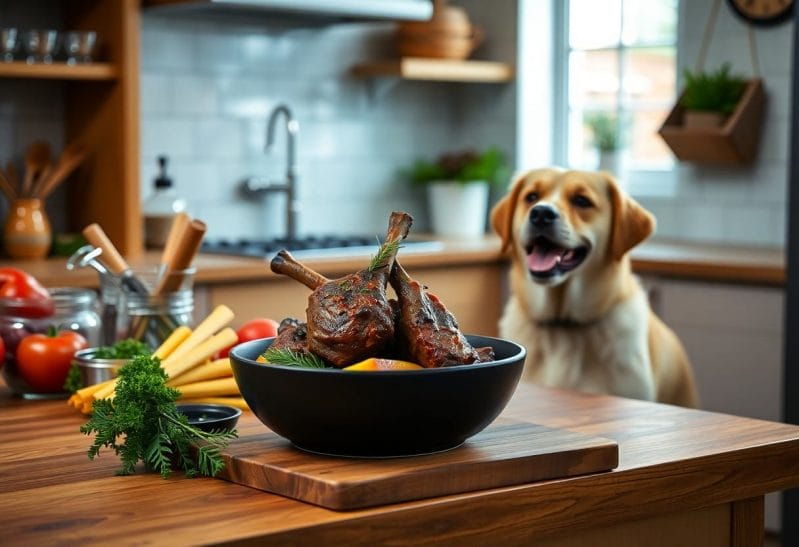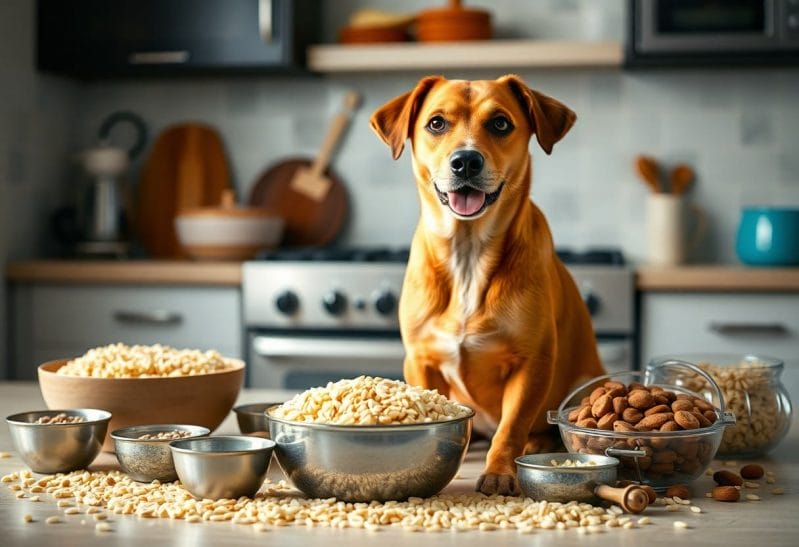Food is a significant part of your dog’s life, and understanding what is safe for them to consume is crucial. You may wonder if peanuts are a suitable treat for your furry friend. While peanuts can be a healthy snack in moderation, it’s crucial to know the potential risks and benefits associated with feeding them to your dog. In this post, we’ll explore whether peanuts are safe for dogs, how to prepare them, and what precautions you should take to ensure your pet’s well-being.
Key Takeaways:
- Moderation: Dogs can eat peanuts in small amounts, but overindulgence may lead to obesity and digestive issues.
- Unsalted and Raw: Always serve unsalted and raw peanuts to avoid unhealthy additives and potential choking hazards.
- Allergies: Monitor for any signs of allergic reactions, as some dogs may be sensitive to peanuts and could experience symptoms like itching or stomach upset.
Nutritional Benefits of Peanuts
The nutritional profile of peanuts makes them an attractive snack option, both for humans and our canine companions. They are packed with beneficial nutrients that can enhance your dog’s diet when offered in moderation.
Protein Content
For a pet parent, it’s imperative to know that peanuts are a rich source of protein, which is crucial for your dog’s muscle development and overall health. The protein in peanuts contributes to strong muscles and aids in the repair of tissues, making them a nourishing snack.
Healthy Fats
With their high-fat content, peanuts are a good source of healthy fats that can provide energy and promote a shiny coat in your dog. These fats can help improve your dog’s overall well-being when consumed in moderation.
Fats play a vital role in your dog’s diet as they facilitate the absorption of fat-soluble vitamins and provide a concentrated energy source. The healthy fats found in peanuts, such as monounsaturated and polyunsaturated fats, can support a balanced diet and contribute to your dog’s vitality. However, portion control is key to preventing unnecessary weight gain.
Vitamins and Minerals
To further understand the benefits of peanuts, you should consider their vitamin and mineral content. Peanuts contain imperative nutrients like vitamin E, magnesium, and phosphorus, which can support various bodily functions in your dog.
For instance, vitamin E acts as an antioxidant, helping to protect your dog’s cells from damage, while magnesium is vital for muscle and nerve function. Phosphorus plays a significant role in bone formation and energy metabolism. Ensuring your dog receives these nutrients can help maintain their overall health and vitality throughout their life.
Potential Risks of Feeding Peanuts to Dogs
Little attention is often paid to the potential risks associated with feeding peanuts to dogs. While peanuts can provide certain nutritional benefits, there are several concerns that every pet owner should be aware of.
Allergies
For some dogs, peanuts can trigger allergic reactions. Symptoms may include itching, swelling, or gastrointestinal distress. If you notice any of these signs after introducing peanuts into your dog’s diet, it’s crucial to consult your veterinarian immediately.
Aflatoxins
The presence of aflatoxins, a naturally occurring toxin produced by certain molds, is another risk associated with feeding peanuts. These toxins can be harmful to your dog’s health and lead to serious illnesses.
Aflatoxins are particularly found in improperly stored peanuts, making it imperative to purchase peanuts from reputable sources. Dogs that ingest aflatoxins can suffer from liver damage, lethargy, and even death in severe cases. Always check the quality of peanuts you offer to your pet to mitigate this risk.
Choking Hazards
Any time you introduce solid snacks like peanuts into your dog’s diet, you run the risk of choking. This is particularly true for smaller dog breeds and puppies.
Risks of choking increase when peanuts are not adequately crushed or served in a size appropriate for your dog. Always supervise your pet when they are eating peanuts, and consider cutting them into smaller pieces to ensure they can chew and swallow safely.
How to Safely Feed Peanuts to Dogs
Despite their nutritional benefits, it’s important to know how to safely feed peanuts to your dog. Understanding the right serving sizes, the types of peanuts to avoid, and proper preparation can help ensure a healthy snack for your furry friend.
Serving Size Recommendations
Size matters when it comes to feeding peanuts to dogs. A good rule of thumb is to limit peanuts to just a few in one sitting, especially for smaller breeds. For larger dogs, a handful may be appropriate, but moderation is key to prevent any digestive upset.
Types of Peanuts to Avoid
One important aspect to consider is the type of peanuts you offer. While unsalted and raw peanuts are generally safe, you should steer clear of:
- Salted peanuts
- Flavored or seasoned peanuts
- Peanut butter containing xylitol
- Chocolate-covered peanuts
- Raw peanuts with mold or aflatoxin contamination
Perceiving the potential harms of certain peanut types helps you make safer choices for your dog’s diet. Below is a summary table:
| Peanut Type | Safety |
|---|---|
| Unsalted Peanuts | Safe |
| Salted Peanuts | Unsafe |
| Flavored Peanuts | Unsafe |
| Peanut Butter with Xylitol | Unsafe |
| Chocolate-Covered Peanuts | Unsafe |
This careful selection of the peanut variety can help ensure your dog’s well-being. Always choose raw or lightly roasted, unsalted peanuts to better support their health:
- Raw peanuts are best
- Unsalted peanuts help prevent sodium-related health issues
- Peanut butter without additives is preferable
- Avoid stale or moldy peanuts
- Only offer peanuts as an occasional treat
Perceiving the importance of peanut quality can significantly affect your dog’s health. Consider this table for reference:
| Peanut Quality | Importance |
|---|---|
| Raw | Best choice for dogs |
| Salted | Can be harmful |
| Flavored | Highly discouraged |
| Stale | Should be avoided |
| Fresh | Ideal for health |
Preparing Peanuts for Dogs
Avoid any added salt, sugar, or seasonings when preparing peanuts for your dog. Always choose raw or unsalted varieties to ensure your dog gets the best health benefits from their snack.
To prepare peanuts for your dog, start with a handful of fresh, raw peanuts. Ensure they are unsalted and free from additives. You can crush or chop them to make them easier to chew for smaller dogs. Always monitor your dog for any adverse reactions when introducing new treats.
Alternative Treats for Dogs
Keep in mind that while peanuts may be a tempting treat for your furry friend, there are many alternative options that can provide health benefits without the potential risks. If your dog happens to consume a large quantity of peanuts, you can find relevant discussions and experiences from other pet owners, such as My dog ate a large amount of peanuts. Exploring alternative treats can help you ensure your dog’s diet remains safe and nutritious.
Nut-Free Options
Alternative treats made without nuts can be a safe choice for your dog. Consider fruits like apple slices (without seeds), carrot sticks, or green beans as tasty, crunchy snacks. These options not only satisfy your dog’s chewing instincts but are also lower in calories.
Healthier Snack Alternatives
An excellent way to keep your dog healthy is by incorporating snacks that are rich in vitamins and minerals. Vegetables such as pumpkin and sweet potatoes can provide beneficial nutrients. Additionally, lean meats like chicken or turkey can be great protein sources and are typically well-received by dogs.
With a variety of healthy snacks available, you can enhance your dog’s diet while also treating them to delightful flavors. Look for options that are free from fillers and artificial additives to truly benefit your pet’s health. Always consult with your veterinarian if you’re unsure about introducing new snack alternatives.
Homemade Dog Treat Recipes
Recipes for homemade dog treats are a fantastic way to ensure your pet is enjoying healthy and safe snacks. By preparing these treats at home, you can control the ingredients and avoid any harmful additives often found in commercial dog treats.
Options for homemade dog treats can include simple ingredients like oats, pumpkin puree, and peanut butter (if you know your dog tolerates it). Searching online for dog-friendly recipes will provide you with a plethora of choices that can be both fun and enriching to make for your beloved pet. Plus, your dog will love the personalized touch of a homemade goodie!
Final Words
Now that you know the ins and outs of feeding your dog peanuts, it’s crucial to make informed choices about their treats. While peanuts can be a safe and nutritious snack in moderation, always be mindful of allergies and choose unsalted, plain options. If you’re ever in doubt, consult your veterinarian for personalized advice tailored to your dog’s needs. For further guidance, check out this comprehensive resource on Can Dogs Eat Peanuts and Peanut Butter?
FAQ
Q: Can dogs eat peanuts safely?
A: Yes, dogs can eat peanuts in moderation, as they are not toxic to them. Peanuts contain healthy fats, proteins, and some necessary vitamins and minerals. However, it is crucial to feed them unsalted and unflavored peanuts to avoid any harmful additives. Always introduce new foods gradually and monitor for any adverse reactions.
Q: What are the potential risks of feeding peanuts to dogs?
A: While peanuts are generally safe for dogs, there are a few risks to consider. Some dogs may have allergies to peanuts, which can lead to symptoms like itching, swelling, or gastrointestinal distress. Additionally, peanuts are high in calories and fat, which can contribute to obesity if fed in large quantities. It’s also advisable to avoid giving dogs whole peanuts in the shell, as they could pose a choking hazard or cause digestive blockages.
Q: How should I feed peanuts to my dog?
A: If you decide to give your dog peanuts, it’s best to serve them plain, unsalted, and shelled. You can either feed them whole peanuts or crush them into smaller pieces for easier consumption. Always keep portions small, especially for smaller dogs, to prevent any choking hazard. Additionally, it’s wise to keep peanut-based products, such as peanut butter, to a minimum and ensure they do not contain xylitol, which is toxic to dogs.











